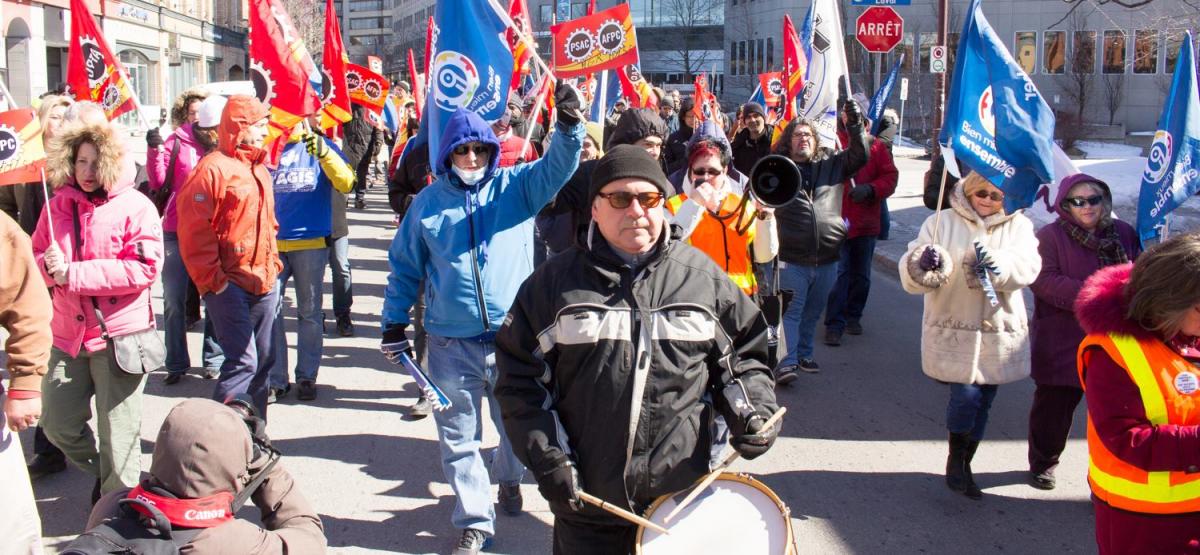
The Harper era was one of antagonism towards the federal public service, especially once he formed a majority in 2011. There were deep cuts to budgets and staffing, along with a growing distrust between public servants and the government, which led to censorship of the former, even in cases where experts simply wished to share research with the public or professional associations.
As such, federal public service unions like the Public Service Alliance of Canada, The Professional Institute of the Public Service of Canada, and the Canadian Association of Professional Employees engaged in a historic campaign to remove Harper from power. It's no stretch to say that the defeat of the Conservatives was due in part to the work of labour to oppose Harper's message and policy.
But the 'stop Harper' approach wasn't uncontroversial in labour circles. While most every major union wanted a new government, there were stark divisions between those that advocated an Anything But Conservative approach, and those more wedded to the NDP. In the end, the former approach won handily, as the Trudeau Liberals stormed to a majority government, with the NDP--and not the Conservatives--being the primary losers.
The federal public sector unions were linked to an ABC mentality, largely because their respective memberships were wary of partisanship beyond anti-Conservatism. Ultimately, and whatever the Liberals' long history--stretching back to the first Trudeau era--of attacking public servants, they were welcomed into power.
The federal public sector unions were linked to an ABC mentality, largely because their respective memberships were wary of partisanship beyond anti-Conservatism. Ultimately, and whatever the Liberals' long history--stretching back to the first Trudeau era--of attacking public servants, they were welcomed into power.
So when the new government came to power on a platform contrasted to the austere Harper years, there was optimism from labour. This feeling has continued into last week's budget announcement. On both fronts, leaders like Robyn Benson and Debi Daviau have cautiously praised the rolling back of laws like C-377, along with a general commitment reverse cuts, restore professional autonomy, and limit the contracting-out of work in the public service.
But there are signs that, with bargaining looming, the tone from both sides is set to change. As I've noted in other sources, the real test of this new relationship will be in how the parties address issues around general compensation, hiring, and sick leave. On that latter issue, the government has already faced opposition from the PSAC among others.
Indeed, the government's approach is hard to pin down, because while the budget has laid out expansionary elements for the public service, claims by Finance Minister Bill Morneau, and Treasury Board President Scott Brison have emphasized the continued need for concessions from civil servants. Specifically, They want to offset the supposed 900 million dollar cost of sick leave, and have also stressed the need for restraint more generally, whatever the budget's tone.
Speaking in broad terms, my biggest takeaway here is that should tensions rise between the government and civil service unions, the options for the latter will be far more limited than under the Harper Conservatives. This is for three primary reasons:
1. The unions' ABC tactics have given a mandate to the Trudeau government's actions:
Unlike with any of Harper's victories, Canadian unions are at least partially responsible for this government's rise to power. This means that should the government take positions unpopular with labour leadership, they will have less of a political mandate to oppose them.
While it was easy for unions like the PSAC to rally members around a Fightback plan when Harper won in 2011, the messaging on why the Liberals may need to be opposed will be much more difficult to draft and proliferate. Members will rightly ask why the union is opposing a government they worked to put into power only months prior.
2. The Liberals' messaging, if not their actions, are much more tactful:
Harper was a shrewd leader, and a gifted political tactician. He knew is base well, and despite being unpopular with a majority of Canadians, was able to hold power for the better part of a decade. But when it came to dealing with labour and the public service, his government was often brash, confrontational, and inflammatory. The result was that rank-and-file public servants--who may not have been politically motivated historically--now had an affirmative interest in seeing the government change. Further, the media's coverage of such an approach made labour much more sympathetic to the average Canadian, meaning that leaders could correlate Harper's general unpopularity with his attacks on public services and those who provide them
The Trudeau Liberals, conversely, will not be so forward in their conflicts with public servants. They understand that image and tone are vitally important, and that even if they take actions similar in intent and effect to Harper, they can limit the activation of rank-and-file and public animosity to decisions.
Liking to point 1, this will limit union leadership's ability to win supportive voices from voters, members, and the media, all of which were imperative in the effectiveness of the Stop Harper campaign.
3. The anti-Harper alliance is no longer in play:
As noted above, Stephen Harper, even when basking his majority government glow, was disliked by a majority of Canadians, who were divided between supporting the four other federal parties, all seen as nominally 'left of centre.' This meant that even as his party wielded absolute parliamentary power between 2011 and 2015, he face opposition at every corner.
The public service unions were able to capitalize on this environment, winning numerous allies to their cause because even though they might not normally be pro-labour forces, they had a common goal in ousting Harper. The PSAC especially was able to may media hay with the "Harper Hates X" buttons, allowing Canadians of all classes to unite in their opposition to the Conservatives.
But the Liberals, even if they take right-wing action, are never as polarizing as the Conservatives. They are consistently the top second choice of Canadian voters, and their actions are less likely to be seen as vindictive or ideologically-motivated. The result is that should the Trudeau regime turn against its civil service, there won't be a pan-Canadian movement willing to stand with them. Most small business people, students, professionals, environmentalists, and non-old-stock Canadian groups will stand with Trudeau as he attacks the rights and standards of unionized workers.
***
My concern is that the Liberals will be able to get away with attacks on public servants that wouldn't be tolerated from Conservatives. People forget that, however bad Harper was, Chretien and Martin were at least a step worst, and Pierre Trudeau violated fundamental labour rights in a manner that would make today's Conservatives blush.
Much like how the turfing of Mulroney allowed a right-wing Liberal regime to sneak into power on vague left promises, so too might we be entering another era of Liberal austerity and anti-worker animus that will prove much more difficult to withstand.
My expectation and hope is that labour leadership, if only hypothetically, is working on how exactly they can energize members should they need to against the solidly popular Trudeau regime. With oil prices low, a deficit quickly increasing, and a government demanding concessions, unions will need to find allies, lest they find themselves an isolated scapegoat of the Liberals once again.
Much like how the turfing of Mulroney allowed a right-wing Liberal regime to sneak into power on vague left promises, so too might we be entering another era of Liberal austerity and anti-worker animus that will prove much more difficult to withstand.
My expectation and hope is that labour leadership, if only hypothetically, is working on how exactly they can energize members should they need to against the solidly popular Trudeau regime. With oil prices low, a deficit quickly increasing, and a government demanding concessions, unions will need to find allies, lest they find themselves an isolated scapegoat of the Liberals once again.



